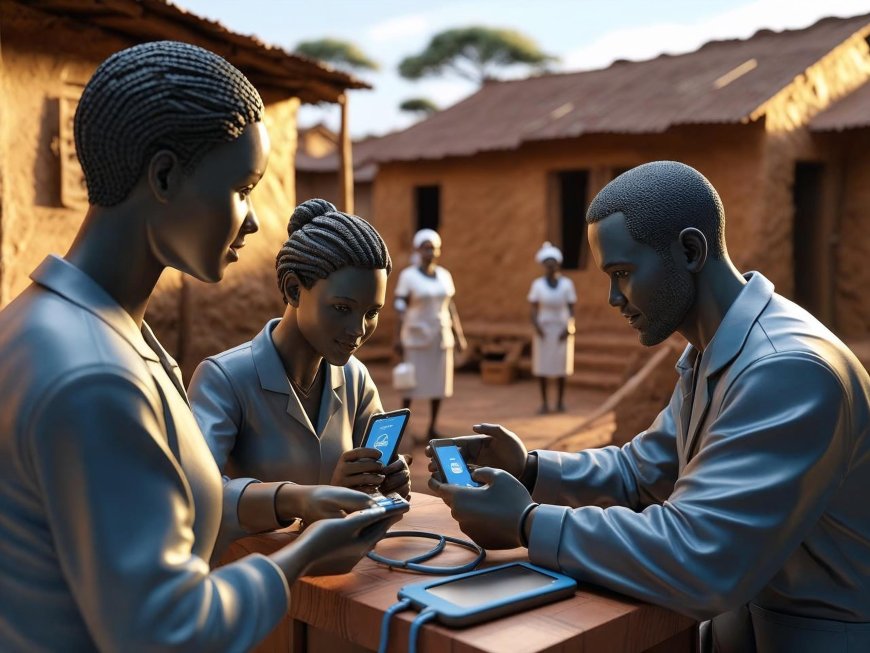Localizing mHealth Solutions for Indigenous Communities
This white paper explores how mobile health (mHealth) interventions can be localized to serve indigenous communities in Africa more effectively. It emphasizes cultural, linguistic, and infrastructural considerations and presents frameworks, case studies, and recommendations for inclusive digital health design.

Abstract
Mobile health (mHealth) solutions have the potential to bridge gaps in healthcare access for marginalized populations, including indigenous communities across Africa. However, most digital health tools are designed for urban or mainstream populations, often overlooking cultural, linguistic, and technological realities in remote areas. This white paper highlights the importance of localizing mHealth platforms to align with the social norms, languages, and health beliefs of indigenous groups—thereby enhancing adoption, trust, and effectiveness.
Introduction
Indigenous communities across Africa—from the San in Southern Africa to the Ogiek of Kenya—have distinct cultural worldviews, languages, and health practices that often diverge from formal biomedical systems. Standard mHealth tools, typically developed in dominant languages with urban design principles, fail to account for this diversity.
“Localization is not translation—it's transformation. It means co-creating digital health tools that speak, look, and act like the communities they aim to serve.”
— African Union Digital Health Working Group, 2022
Why mHealth for Indigenous Communities?
-
Remote Access: mHealth provides clinical guidance, education, and emergency referrals in hard-to-reach regions.
-
Community Empowerment: Tools can strengthen the capacity of local health workers.
-
Continuity of Care: Mobile tools help track maternal health, immunizations, and infectious diseases.
-
Data Visibility: Enables collection of health indicators from underrepresented populations.
Yet, these benefits are only realized when solutions are properly localized.
Key Localization Challenges
1. Language Barriers
-
Many indigenous languages are oral, with no standardized written form.
-
mHealth interfaces often exclude non-dominant languages.
-
Translation tools (like Google Translate) offer little support for local dialects.
Example: The Samburu community in Kenya reports lower usage of health apps due to lack of Maa-language support.
2. Cultural Mismatch
-
Messaging that emphasizes biomedical concepts may conflict with indigenous health beliefs.
-
Gender dynamics may affect mobile phone access and use among women and elders.
-
Concepts like mental health or vaccination may be interpreted differently.
3. Infrastructure Limitations
-
Poor mobile network coverage and unreliable electricity restrict mHealth access.
-
Most indigenous community members use basic feature phones (2G), not smartphones.
4. Digital Literacy Gaps
-
Low literacy and tech familiarity limit engagement with text-heavy apps.
-
Health workers in these areas often need ongoing support for device and software use.
Case Studies
🌍 Botswana’s Talking Book Project
An audio-based mHealth device preloaded with health messages in Setswana and San languages. Used by community health volunteers to deliver maternal and child health education.
🌍 Kenya’s Jamii Smart Initiative
In Laikipia and Baringo, the app was adapted with Maa voice prompts and culturally appropriate visuals to assist community health volunteers serving pastoralist groups.
Implemented by Amref Health Africa.
https://amref.org/
🌍 Namibia’s MyDigitalHealth Pilot
Used USSD-based surveys and symptom checkers in indigenous languages. Short voice notes were used for low-literacy users, increasing uptake by 44%.
Best Practices for Localizing mHealth Solutions
| Area | Strategy |
|---|---|
| Language | Co-develop content with local translators and storytellers; use voice or icons |
| Interface Design | Leverage images, audio prompts, and simplified navigation for low-literacy users |
| Gender Sensitivity | Consider household dynamics and cultural norms in content delivery |
| Device Optimization | Design for basic phones (USSD, SMS, IVR) before smartphones |
| Cultural Relevance | Involve traditional healers and elders in co-design and health messaging |
| Feedback Loops | Create channels for community input and iteration |
Recommendations
1. Co-Creation with Communities
-
Use participatory design methods where indigenous people actively shape features, content, and delivery models.
2. Leverage Oral Traditions
-
Convert health messages into stories, songs, and local proverbs for better recall and acceptance.
3. Support Language Preservation
-
Partner with linguists to codify indigenous languages for digital use, creating dual impact: healthcare + cultural preservation.
4. Train Community Health Workers (CHWs)
-
Equip CHWs from within the community to serve as mHealth mediators and educators.
5. Monitor Impact with Equity Metrics
-
Disaggregate app usage and health outcomes by ethnicity, language, and region to track inclusion.
Tools & Platforms for Localized mHealth
-
Viamo 321 – IVR-based info services in local languages across 20+ African countries
https://viamo.io/ -
Telerivet – Supports custom USSD/SMS apps for basic phones
https://telerivet.com/ -
OpenSRP – Community health worker platform that supports multilingual and offline use
https://smartregister.org/
Conclusion
Localization is the key to unlocking the full potential of mHealth in Africa’s indigenous communities. Rather than retrofitting generic tools, stakeholders must invest in culturally rooted, linguistically inclusive, and technologically appropriate designs. With community participation and respect for traditional knowledge, mHealth can become a bridge—not a barrier—to equitable care.
References (APA 7th Edition)
African Union. (2022). AU Digital Health Framework: Equity, Trust, and Inclusion.
https://au.int/en/documents/2022-09-22/africa-digital-health-framework
Amref Health Africa. (2021). Jamii Smart: Digital health for remote communities.
https://amref.org/
Literacy Bridge. (2019). Talking Book: Empowering communities through localized audio health messages.
https://www.literacybridge.org/
Viamo. (2023). Reaching remote communities with mobile-based information services.
https://viamo.io/
World Health Organization. (2021). Ethics and governance of artificial intelligence for health.
https://apps.who.int/iris/handle/10665/341996
What's Your Reaction?
 Like
0
Like
0
 Dislike
0
Dislike
0
 Love
0
Love
0
 Funny
0
Funny
0
 Angry
0
Angry
0
 Sad
0
Sad
0
 Wow
0
Wow
0
















































































